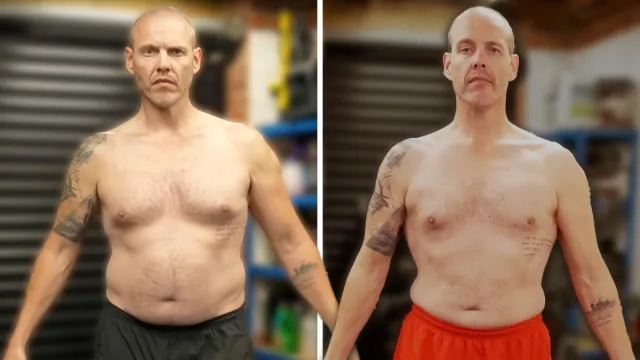Fitness Expert Reveals What Really Happened When He Tried the Celebrity Weight Loss Shot
Mark Lewis isn't your typical fitness influencer. After struggling with weight and motivation in his 30s, he transformed himself into a multi-sport competitor who now creates content full-time. But recently, he decided to try something controversial: the "celebrity fat jab." His candid experience might surprise you.
Understanding How These Weight Loss Drugs Work
"Ozempic enhances the release and action of insulin throughout the body, which helps with fat loss," explains Dr. Sue Decotiis, MD, NYC weight-loss doctor. She adds that these medications "have a tremendous effect on satiety, shutting down appetite so the patient feels very full after eating much less food."
Why Even A Fitness Expert Needed Help
"I have been very overweight in the past, and it has always been down to something up here encouraging me to eat when I don't really want to eat," Lewis explains in his video. He describes his challenge not as a lack of willpower but rather an "infuriating excess of strength" where the part of his brain wanting to eat is simply stronger than any other part.
The Hormone Reset Effect
Dr. Decotiis explains that these medications "help regulate people's hormones that have changed due to aging, stress, etc. so that they can lose weight." This aligns with Lewis's experience of suddenly having a completely different relationship with food.
RELATED: 20 Possible Ozempic Side Effects
The Cost Reality: A Tale of Two Countries
Lewis reports that the medication costs between £100 and 200 monthly ($130 and $260) in the UK. "Americans are paying thousands," he notes. According to GoodRx, without insurance, Ozempic can cost between $937.98 and $1,014 per month in the US.
The Mental Breakthrough Nobody Talks About
"I have never forgotten to eat meals before," Lewis reveals. "I was just eating and thinking about eating normally for the first time in ever." Dr. Decotiis has observed similar psychological benefits: "When people lose weight, they have better self-esteem, and they feel more confident in their own skin."
Daily Life Changed Dramatically
Lewis found himself experiencing scenarios he "could just never have imagined before." He describes, "I was going on long car journeys and eating maybe a small packet of peanuts instead of an absolute barrage of junk food. I was buying petrol without picking up snacks." Even more surprising was his response to social situations: "When crisps and dips and stuff were put in front of me at friends' houses when socializing, I just had no interest beyond having maybe a couple. I wasn't fighting the urge to eat. I wasn't trying to keep those thoughts at bay. They just did not exist, and it was wonderful."
Freedom From Food Guilt
"In the last six weeks, I have not had any feelings of guilt from having overindulged, and I've not felt ill from having overindulged. I've enjoyed food more than I can remember," Lewis shares. The transformation went beyond just eating less – it changed his entire experience with food. He describes leaving the table "content" for the first time, without the usual mental battle of wanting second or third helpings. "If you have never experienced any sort of compulsive or addictive behavior, it's quite hard to explain what an absolute relief it is to just have them vanish."
RELATED: This Mom Went From a Size 10 to a 4 in 90 Days After Discovering These 5 Weight Loss Truths
The Medical Reality Behind the Hype
According to the National Library of Medicine, while Ozempic is primarily approved for type 2 diabetes, Wegovy (same medication, different brand) is specifically approved for weight management in adults with obesity or overweight adults with related health conditions.
Addressing the Critics and Stigma
"If you consult with your doctor and they deem it to be a safe and appropriate course of action, listen to your doctor. Do not listen to some Muppet yelling 'eat less, move more' on the internet," Lewis asserts.
The Long-Term Consideration
Studies show that one year after stopping the medication, participants regained two-thirds of their prior weight loss. This underscores Lewis's emphasis on using medication as a tool while developing sustainable habits.
Making an Informed Decision
These medications aren't "an easy way out" but rather a tool that "helps you not eat the pizza," as Lewis puts it. Dr. Decotiis adds that it "resets the amount of weight that your body wants to hold onto," suggesting a more complex mechanism than simple appetite suppression.
RELATED: I'm a Fitness Expert: Here's What Really Burns More Fat After 40, Walking or HIIT
What to Expect: Side Effects and Monitoring
While Lewis had minimal side effects, it's important to note that common side effects can include nausea, vomiting, diarrhea, and abdominal pain. Regular medical supervision and starting with a lower dose are standard practices.
The Future of Weight Management
While many solutions, like intermittent fasting or specialized diets, can be beneficial, they haven't solved the global obesity crisis. As Lewis points out, "If there's a means of those people facilitating their ability to control what they eat, they should be applauded, not derided." And if you enjoyed this article, don't miss 20 Incredible Ozempic Success Stories of All Time.





